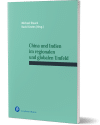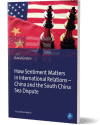Our author David Groten agreed to reply to our 5 questions. Before we start, here is a short CV:

David Groten studied European Politics and Economics, International Politics and International Law in Maastricht, Stockholm, and Amsterdam. He received his Ph.D. in Economic and Social Sciences. He is Postdoctoral research fellow at Helmut-Schmidt University Hamburg, Institute of International Politics. David Groten is conducting research and policy analysis, is engaged in project management and teaches courses on international cooperation, Chinese foreign policy and qualitative research methods. Prior to that, he has been working in the fields of governmental affairs and corporate communications in Berlin.
What will be the main challenge for your research field in the coming years?
In times of growing national egoism and self-centeredness in global politics, vital research fields such as peace and conflict studies, emotions research and political psychology at large are increasingly being marginalized, both in international relations research but particularly in international diplomacy and foreign affairs. Hence, a stronger emphasis of these fields’ instruments and approaches such as dialogue, compromise, empathy, and self-reflection is vital in order to sustainably mitigate political conflicts instead of further aggravating them.
Why would anyone want to pursue research in your field?
On the one hand, it is a remarkably understudied field of research. On the other hand, a direct link to and relevance to political realities and international conflicts is provided. This makes it quite interesting for scholars and students to conduct research in international relations at large and specialize in political psychology or peace studies in specific.
Why did you choose your research field? What motivates you in your field in particular?
The interplay between politics, culture, psychology and legal issues has always sparked my academic interest. Moreover, I am convinced that a continuation of the increasingly reckless, self-centered and nationalistic ways of conducting foreign politics without seeking to seriously acknowledge counterparts’ cognitive needs, ideas, sentiment, and interests will only further perpetuate fault lines, hamper creative approaches to conflict management and promote worst-case decision-making. That said, the South China Sea dispute and the rise of China, if not handled carefully, have the potential to cause severe global repercussions. It is, thus, crucial to expanding existing scientific and political discourses in order to offer alternate perspectives, variables, and approaches to conflict resolution and raise awareness thereof.
Which (academic) book has influenced you the most?
‘Perception and Misperception in International Politics’ by Robert Jervis. A truly insightful read by one of the first scholars to emphasize the role of cognition in international relations research and to stress that it can easily turn into political reality.
I am author with Barbara Budrich because …
… not only is it a renowned publishing house but also does its staff provide researchers with reliable and valuable guidance and personal contact throughout the entire publishing process.
David Groten at Budrich:

 Michael Staack, David Groten (eds.) 2018: China und Indien im regionalen Umfeld.
Michael Staack, David Groten (eds.) 2018: China und Indien im regionalen Umfeld.
New on June 11, 2019: How Sentiment Matters in International Relations: China and the South China Sea Dispute.

